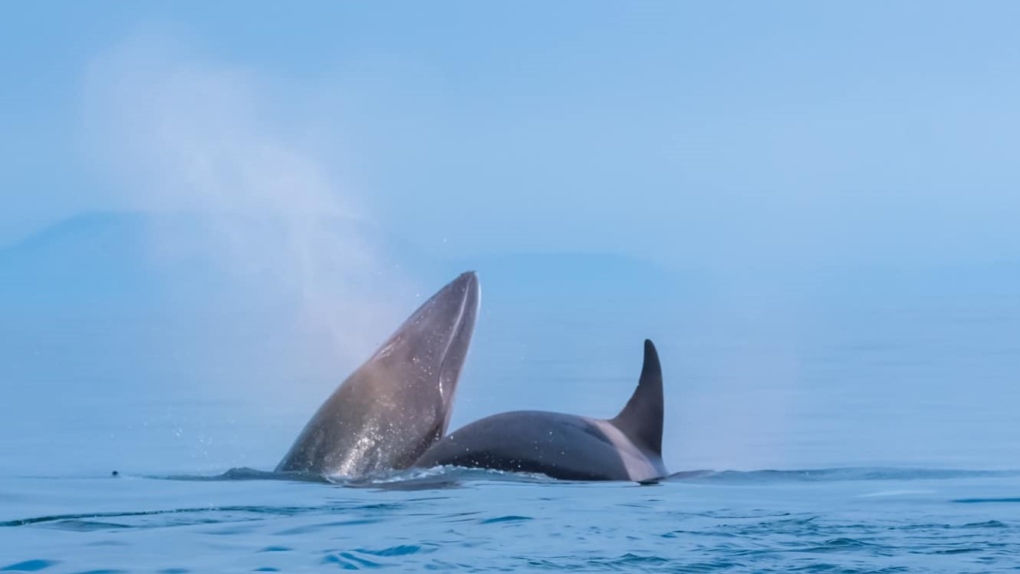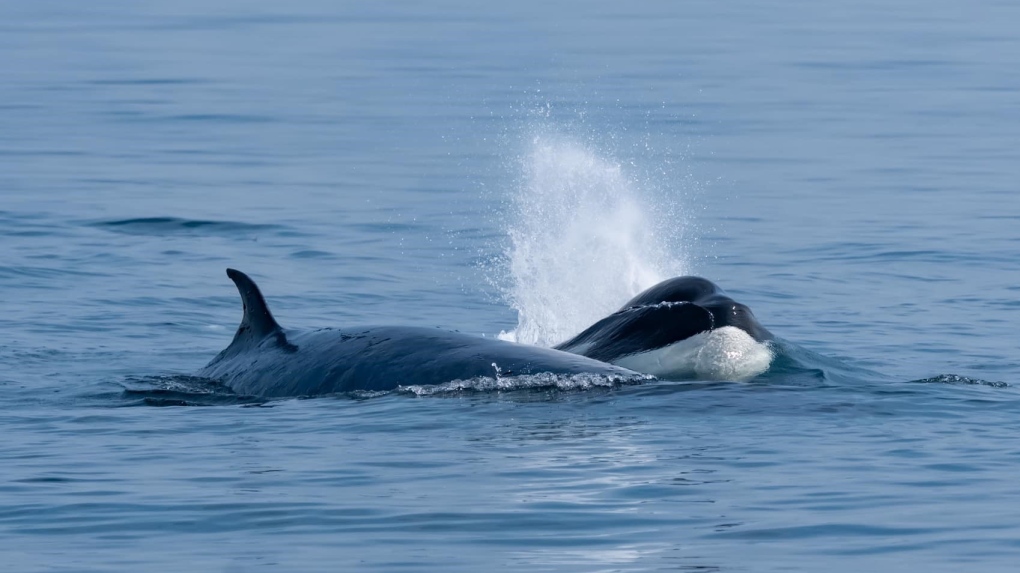Orcas filmed preying on minke whale south of Victoria
A group of transient orcas, or Bigg's killer whales, were seen hunting a minke whale south of Victoria on Friday afternoon.
The dramatic hunt occurred near Smith Island, Wash., about 40 kilometres south of Victoria, and involved nine orcas from two pods preying on a single minke whale.
According to the Pacific Whale Watch Association, the orcas were able to bring down the minke whale in about 30 minutes, which is relatively fast for such an event.
 Transient orcas are seen hunting a minke whale near Smith Island, Washington. (April Ryan / Maya's Legacy Whale Watching)
Transient orcas are seen hunting a minke whale near Smith Island, Washington. (April Ryan / Maya's Legacy Whale Watching)
Minke whales can reach up to nine metres long and weigh up to 10 tonnes, according to the PWWA.
Bigg's killer whales are known to prey on minke whales, though the orcas generally stick to smaller prey, like seals, sea lions or porpoises, according to PWWA executive director Erin Gless.
Gless says that transient orca attacks on minke whales have been witnessed in the past, but Friday's encounter is probably the "best documented case" of such an event.
Friday's hunt came less than two weeks after a group of Bigg's killer whales were seen battling humpback whales off Vancouver Island.
The two incidents are unrelated, however, according to Gless.
"The orcas involved in the minke attack, the T65A's and T99's, were not the same orcas involved in the humpback encounter," she said.
 Transient orcas are seen hunting a minke whale near Smith Island, Washington. (April Ryan / Maya's Legacy Whale Watching)
Transient orcas are seen hunting a minke whale near Smith Island, Washington. (April Ryan / Maya's Legacy Whale Watching)
The Pacific Whale Watch Association is working with the Northeast Pacific Minke Whale Project to identify the minke whale that was killed.
Minke whales are known to visit the Salish Sea seasonally, and it's believed that this whale had been documented in the region as far back as 1982.
"It's thought that minkes only live to be about 50 years old, so despite a dramatic end, this whale lived a full life," said the PWWA in a social media post Monday.
Transient orcas – which mostly prey on pinnipeds – are different from their critically endangered relatives, southern resident killer whales, which mainly prey on salmon.
CTVNews.ca Top Stories

Prime Minister Trudeau meets Donald Trump at Mar-a-Lago
Prime Minister Justin Trudeau landed in West Palm Beach, Fla., on Friday evening to meet with U.S.-president elect Donald Trump at Mar-a-Lago, sources confirm to CTV News.
'Mayday! Mayday! Mayday!': Details emerge in Boeing 737 incident at Montreal airport
New details suggest that there were communication issues between the pilots of a charter flight and the control tower at Montreal's Mirabel airport when a Boeing 737 made an emergency landing on Wednesday.
Hit man offered $100,000 to kill Montreal crime reporter covering his trial
Political leaders and press freedom groups on Friday were left shell-shocked after Montreal news outlet La Presse revealed that a hit man had offered $100,000 to have one of its crime reporters assassinated.
Questrade lays off undisclosed number of employees
Questrade Financial Group Inc. says it has laid off an undisclosed number of employees to better fit its business strategy.
Cucumbers sold in Ontario, other provinces recalled over possible salmonella contamination
A U.S. company is recalling cucumbers sold in Ontario and other Canadian provinces due to possible salmonella contamination.
Billboard apologizes to Taylor Swift for video snafu
Billboard put together a video of some of Swift's achievements and used a clip from Kanye West's music video for the song 'Famous.'
Musk joins Trump and family for Thanksgiving at Mar-a-Lago
Elon Musk had a seat at the family table for Thanksgiving dinner at Mar-a-Lago, joining President-elect Donald Trump, Melania Trump and their 18-year-old son.
John Herdman resigns as head coach of Toronto FC
John Herdman, embroiled in the drone-spying scandal that has dogged Canada Soccer, has resigned as coach of Toronto FC.
Weekend weather: Parts of Canada could see up to 50 centimetres of snow, wind chills of -40
Winter is less than a month away, but parts of Canada are already projected to see winter-like weather.

































